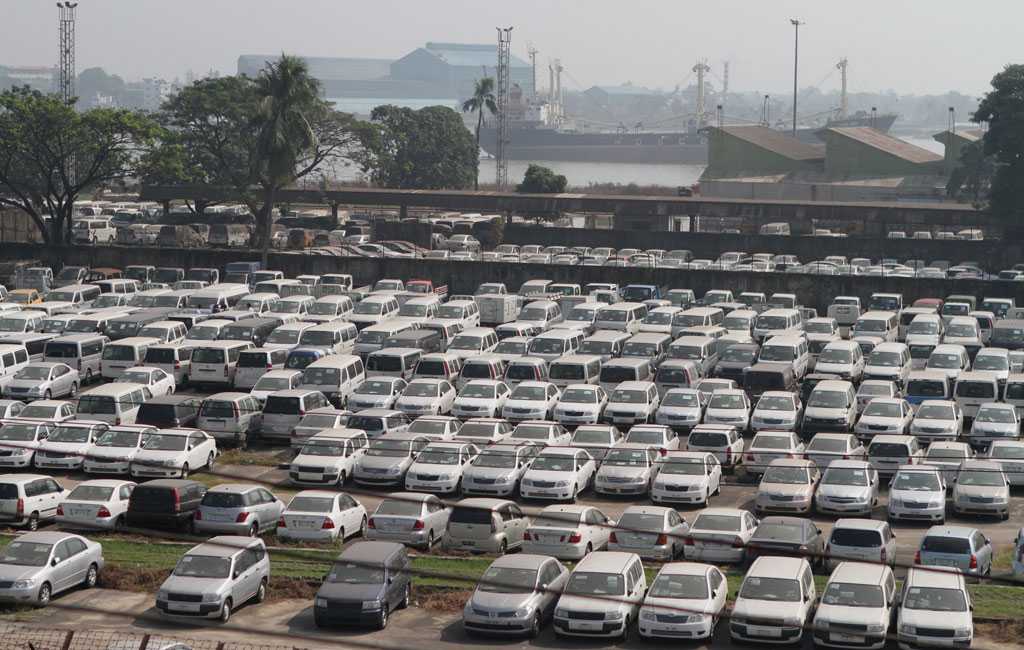Reconditioned car imports take a nosedive: Industry people cite high tariff, rising trend of ridesharing as major factors

Image collected
Fall in price depreciation on imported reconditioned vehicles from 45% to 35% in 2018-2019 fiscal increased the cost of import, says Abdul Haque, president of Bangladesh Reconditioned Vehicles Importers and Dealers Association (BARVIDA)
Imports of reconditioned vehicles declined by nearly 46% in last fiscal year as high tariff, liquidity crisis in banking sector and popularity of ridesharing services put negative impacts on sales of used automobiles in the domestic market.
In 2017-18 fiscal year, 23,075 reconditioned vehicles were imported, which fell to 12,502 in 2018-19 fiscal year, according to the National Board of Revenue (NBR) data.
Fall in price depreciation on imported reconditioned vehicles from 45% to 35% in 2018-2019 fiscal increased the cost of import, says Abdul Haque, president of Bangladesh Reconditioned Vehicles Importers and Dealers Association (BARVIDA).
He claims that in many cases the tariffs on reconditioned cars are higher than those on new brand cars due to tariff discrepancies.
As a result, traders have become conservative these days in importing reconditioned cars, Haque, also owner of Haq's Bay Automobiles Ltd, says.
“We used to enjoy 45% price depreciation facility for importing reconditioned vehicles for five years as of 2017-18 fiscal year. But now the depreciation has fallen to 35% causing decline in imports because of the increased import cost,” explains Abdul Haque.
In 2008-09 fiscal year, the number of imported reconditioned vehicles was 33,178, which declined to 7,353 in 2012-13 fiscal year, according to data of the National Board of Revenue (NBR).
However, the number of imported reconditioned vehicles began to rise from FY 2013-14, as the volume increased to 23,075 in 2017-18 fiscal year. The trend declined again, as the number stood at 12,502 in 2018-19 fiscal year, a slump by 45.82%, shows the NBR data.
The highest number of 33,178 cars were imported in 2008-09 fiscal year. The demand for cars had increased drastically due to the vibrant stock market and available liquidity during the period, according to industry people.
“Now the banking sector is facing huge liquidity crisis. As a result, the banks rarely sanction loans for car purchase,” says MA Hasib, owner of MAX Power Bangladesh, an importer of reconditioned vehicles.
Talking to Dhaka Triune, MA Hasib says the bank’s loan to buy cars is now limited. The lenders pay only 50% of the price of a car which should be increased to 70% to facilitate owning cars by individuals, he adds.
He believes import of reconditioned has declined due mainly to the expansion of ridesharing companies and their popularity among city dwellers, particularly in the capital. Now many people in Dhaka city prefer ridesharing to maintaining a car, MA Hasib points out.
Reconditioned vehicles are mostly imported from Japan. The imported vehicles include private cars, pick-up vans and microbuses.
According to market players, high tariff is the main reason for skyrocketing prices of both new brands and reconditioned cars in the domestic market. If the government does not want to reduce the tariff, the major solution lies in producing cars or establish car assembling plants in the country to reduce prices.
According to the NBR, importing a car is quite costly in Bangladesh that involves 25% import duty, 15% to 500% supplementary duty depending on the size of the engine, 15% VAT, 5% advance tax, 5% regulatory tax and 4% advance trade VAT on tariff value.
Source: https://www.dhakatribune.com
Tags :
Previous Story
- Dhaka stocks rebound on tax review hope
- Stocks rise after 2-day plunge on tax proposal...
- Construction sector against any tax, VAT hike
- ‘Bangladesh to become beacon of tourism’
- NBR chairman: TIN not mandatory for opening BO...
- Special Facilities Provided by BCI to the Young...
- Duty waiver to boost local manufacturing of motorcycles
- ATA Carnet System implementation will help boost trade:...